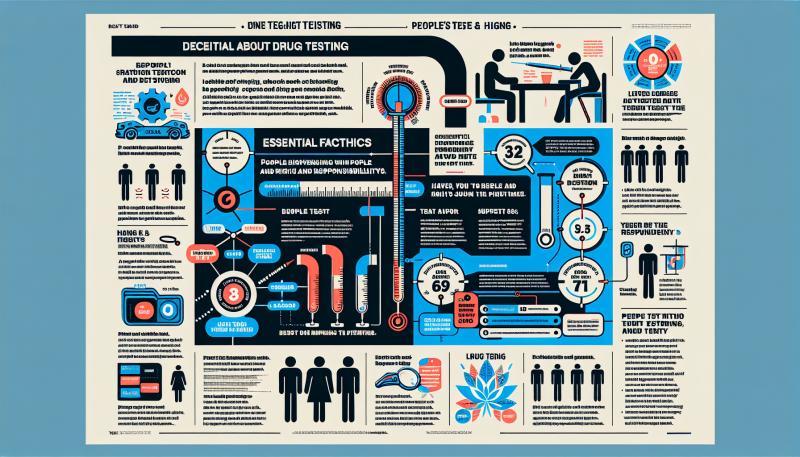
Essential Facts About Drug Testing: Know Your Rights and Responsibilities
In today's world, drug testing is a common practice across numerous sectors and industries. Whether you're an employee, student, or just someone undergoing a routine health check, understanding your rights and responsibilities regarding drug tests is crucial. It ensures that you are well-prepared, knowledgeable about the legal standards, and can navigate the process with confidence. This article will delve into the essential facts about drug testing, helping you to understand both your rights and responsibilities.
What Is Drug Testing and Why Is It Conducted?
Drug testing refers to the analysis of biological specimens, such as urine, blood, hair, or saliva, to detect the presence of specific substances. Companies and organizations implement these tests for various reasons, including:
- Ensuring workplace safety: Industries that involve operating machinery or handling sensitive information often conduct drug tests to maintain a safe and secure environment.
- Compliance with regulations: Certain sectors are required by law to conduct drug testing. For example, the Department of Transportation (DOT) mandates drug tests for safety-sensitive transportation employees.
- Enhanced productivity: Employers aim to maintain high standards of productivity, often necessitating drug screening to deter and detect substance abuse.
Your Rights: What You Should Know
When it comes to drug testing, it's important to be aware of your rights. Here's a breakdown of key rights you have:
- Right to Privacy: Employers must respect your privacy when conducting drug tests. The process should be handled professionally and without undue invasion of personal space.
- Informed Consent: You should be informed about the drug testing policy, including when and how tests will be conducted, and potential consequences of a positive result.
- Challenge Results: In the event of a positive test result, you have the right to request a secondary confirmation test or challenge the results through an established appeal process.
- Non-Discrimination: Drug tests should be applied consistently among all employees in similar positions, without discrimination or bias against specific individuals.
Your Responsibilities: Being Prepared and Compliant
While understanding your rights is important, knowing your responsibilities is equally crucial. Here’s what you should keep in mind:
- Understand Company Policies: Familiarize yourself with your employer's drug testing policy, including the substances tested for and the procedures they follow.
- Maintain Transparency: If you are taking prescription medication that could impact the test results, notify the testing authority ahead of time.
- Comply with Procedures: Follow instructions for the specimen collection process carefully, including adhering to time frames and procedural guidelines.
- Respect Testing Protocols: Attempting to tamper with or evade a drug test is often grounds for serious disciplinary action or termination.
Types of Drug Tests
Various types of drug tests are used depending on the situation and requirements. The most common types include:
- Urine Tests: The most widely used method, urine testing is cost-effective and can detect a range of substances within a short timeframe post-use.
- Blood Tests: While more invasive and costly, blood tests provide detailed and accurate results, often used for verifying positive results from urine tests.
- Hair Tests: This method can detect drug use over a more extended period, typically up to 90 days, making it useful for identifying long-term substance use.
- Saliva Tests: Saliva tests are non-invasive, easy to administer, and detect recent drug use, usually within the past few hours to two days.
Legal Considerations and State Laws
Drug testing laws vary widely from state to state. It's vital to understand the legal landscape within your state to ensure your rights are protected. Consider these points:
- State-Specific Laws: Research the drug testing laws and regulations specific to your state, as they govern how and when tests can be administered.
- Federal Regulations: For industries regulated by federal law, such as the DOT, adherence to federal drug testing guidelines is mandatory, regardless of state laws.
- Employer Discretion: Outside federally mandated testing, private employers typically have discretion over implementing drug testing policies, within the bounds of state laws.
Potential Implications of a Drug Test
The outcome of a drug test can have significant implications for employment, healthcare, and legal standing. Consider these scenarios:
- Employment Decisions: Positive results can lead to disciplinary action, termination, or impact hiring decisions if you are a job applicant.
- Healthcare Considerations: Test results may be used to inform treatment plans for those with substance abuse issues.
- Legal Consequences: In certain cases, especially in law enforcement or legal contexts, drug testing may impact legal outcomes or custody decisions.
Conclusion: Empowering Yourself with Knowledge
Understanding the intricacies of drug testing, from knowing your rights and responsibilities to comprehending the types of tests and legal implications, empowers you to navigate the process confidently. Whether you're facing an employer-mandated test or undergoing routine health checks, being informed ensures your rights are protected, and you're prepared for any eventuality. It's always advisable to stay updated with the latest regulations and policies related to drug testing, as these can change and impact your rights and responsibilities.
For professional advice or drug testing services, consider reaching out to IMS Screening Solutions. They offer reliable and comprehensive screening solutions tailored to meet your needs. Visit their website at https://www.imsscreenings.com for more information.
